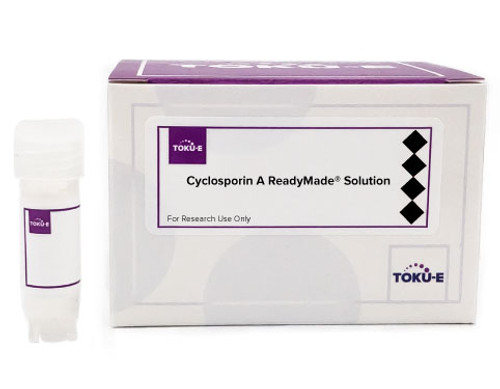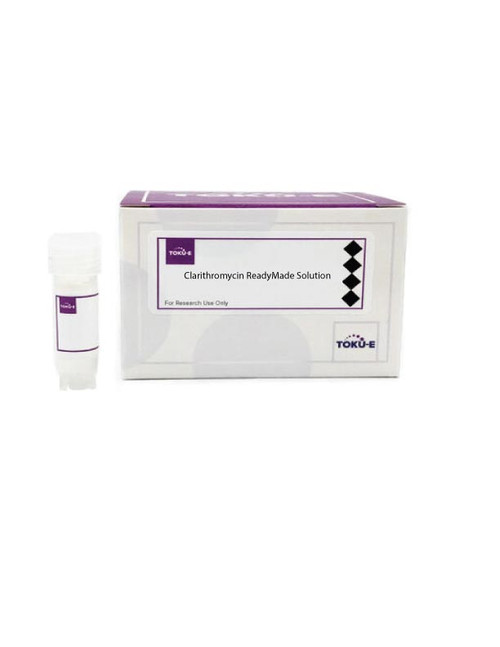Salinomycin ReadyMadeTM solution is provided as a sterile-filtered solution of Salinomycin Sodium formulated in water at a concentration of 2 mg/ml. It has been filter-sterilized using a 0.22 μm filter.
Salinomycin (syn: Coxistal, Coxistac) is a monocarboxylic polyether ionophore isolated from Streptomyces albus that has been widely used as an agricultural antibiotic to prevent coccidiosis in poultry. Salinomycin was first isolated in 1974 by the research division of Kaken Chemical Co. in Tokyo Japan.
Salinomycin affects cell membrane permeability by increasing cation movement across cell membranes through exchange-diffusion, resulting in altered gradients due to a lack of control of ion permeability. This allows ions (K+, Na+, Ca+, Mg2+) to accumulate inside the cell, reaching toxic levels. Salinomycin is effective against Gram-positive bacteria including mycobacteria, some filamentous fungi, and coccidia.
Salinomycin Sodium has been shown to induce apoptosis in a variety of cancer cell lines and to inhibit multidrug resistance protein 1.
We also offer:
- Salinomycin Sodium (S002)
| Mechanism of Action | Salinomycin interacts with the Gram-positive cell membrane which decreases control of ion permeability. This allows ions (K+, Na+, Ca+, Mg2+) to accumulate inside the cell to toxic levels. |
| Spectrum | Salinomycin targets primarily the Gram-positive cell wall to allow ion transport into the cell. Gram-negative organisms are unaffected by Salinomycin because of their additional outer membrane. Salinomycin is also effective against mycobacteria, some filamentous fungi, and Coccidia. |
| Microbiology Applications | Salinomycin is commonly used in clinical in vitro microbiological antimicrobial susceptibility tests (panels, discs, and MIC strips) against Gram-positive microbial isolates. Medical microbiologists use AST results to recommend antibiotic treatment options. Representative MIC values include:
Clostridium perfringins 0.12 µg/ml – 0.25 µg/ml For a representative list of Salinomycin MIC values, click here.
|
| Cancer Applications | Salinomycin is a promising anti-cancer agent which selectively targets cancer stem cells. Cancer stems cells (CSCs) are a subpopulation of cells within tumors that drive tumor growth and recurrence. They are resistant to many current cancer treatments. Salinomycin shows selective toxicity for the CSCs that exist as a subpopulation within HMLER breast cancer cells. A Salinomycin treatment of 4T1 and MCF-7-Ras breast cancer cell lines results in a reduction of CSCs. Treatment of 5 mg/kg Salinomycin in mice implanted with SUM159 human breast cancer cells inhibits mammary tumor growth and induces increased epithelial differentiation of tumor cells.
The mechanism(s) for the anti-cancer properties of Salinomycin are still unclear, activation of unconventional pathways of cell death, enhanced DNA damage, and inhibition of Wnt signaling pathway, appear to be plausible mechanisms for the multi-dimensional anti-CSC and anti-tumorigenic activities of Salinomycin. Salinomycin was shown to induce apoptosis in human cancer cells and overcomes apoptosis resistance through a pathway independent of activation of p53, caspase, CD95/CD95L system, and the proteasome. Salinomycin in combination with doxorubicin or etoposide led to increased DNA damage and resulted in massive apoptosis in drug resistant cancer cells (Kim et al, 2011). Salinomycin inhibits CD44 expression in breast cancer cells in vitro. |
| Molecular Formula | C42H69NaO11 |
| References |
Fangyuan Xie et al. used Salinomycin (TOKU-E) to study its efficacy toward liver cancer cells when used in combination with chloroquine: Codelivery of Salinomycin and chloroquine by liposomes enables synergistic antitumor activity in vitro. Gupta P et al (2009) Identification of selective inhibitors of cancer stem cells by high-throughput screening. Cell 138 (4): 645–659 PMID 19682730 Huczynski A (2012) Salinomycin – a new cancer drug candidate. Chem. Biol. Drug Des. 79: 235–238 PMID 22145602 Kim JH et al (2011) Salinomycin sensitizes cancer cells to the effects of doxorubicin and etoposide treatment by increasing DNA damage and reducing p21 protein. Br. J. Pharmacol. 162:773–784 PMID: 20973777 Yurkovich ME et al (2011) A late-stage intermediate in Salinomycin biosynthesis is revealed by specific mutation in the biosynthetic gene cluster. Chem BioChem 13 (1): 66–71 Zhou S et al (2013) Salinomycin: A novel anti-cancer agent with known anti-coccidial activities. Curr. Med. Chem. 20(33):4095-4101 PMID 23931281 |








